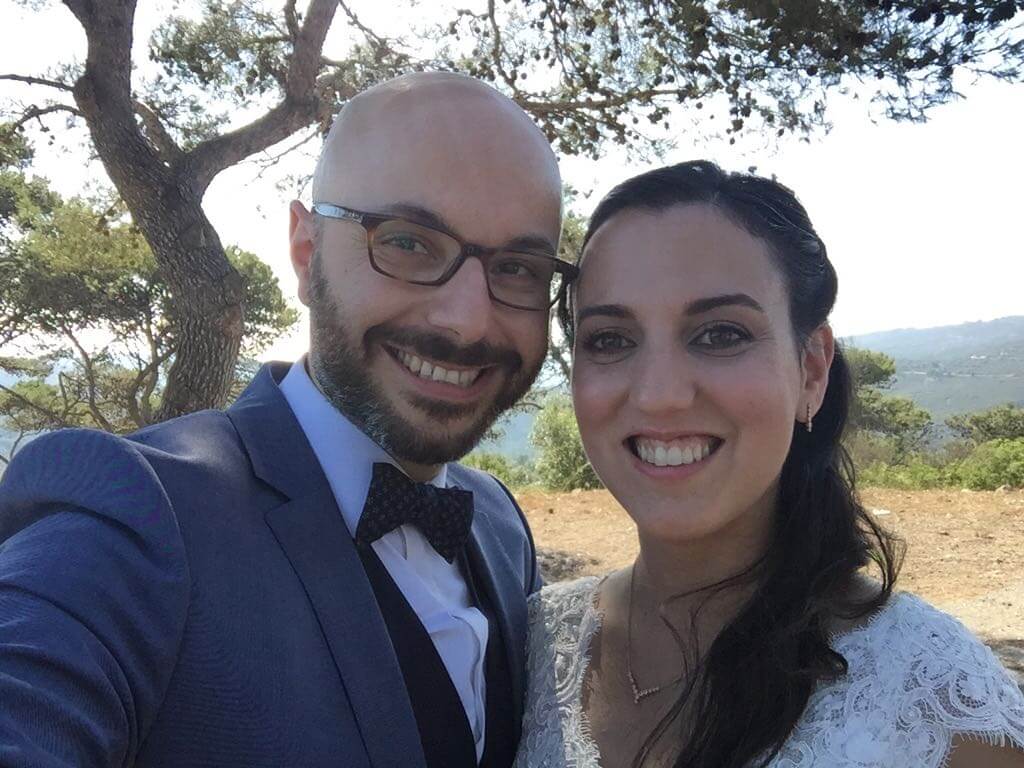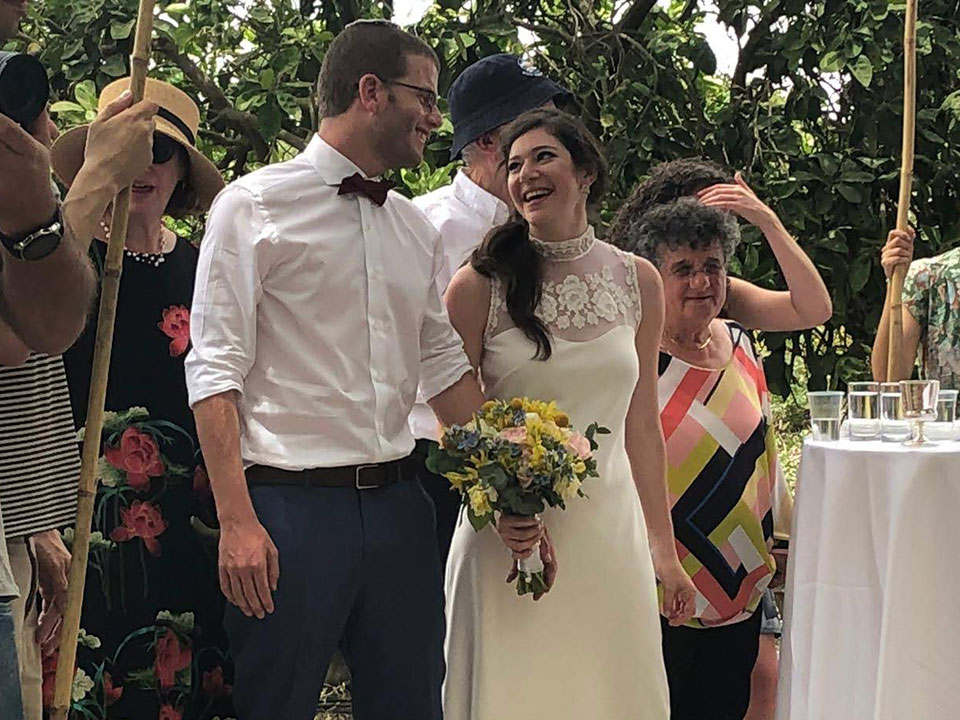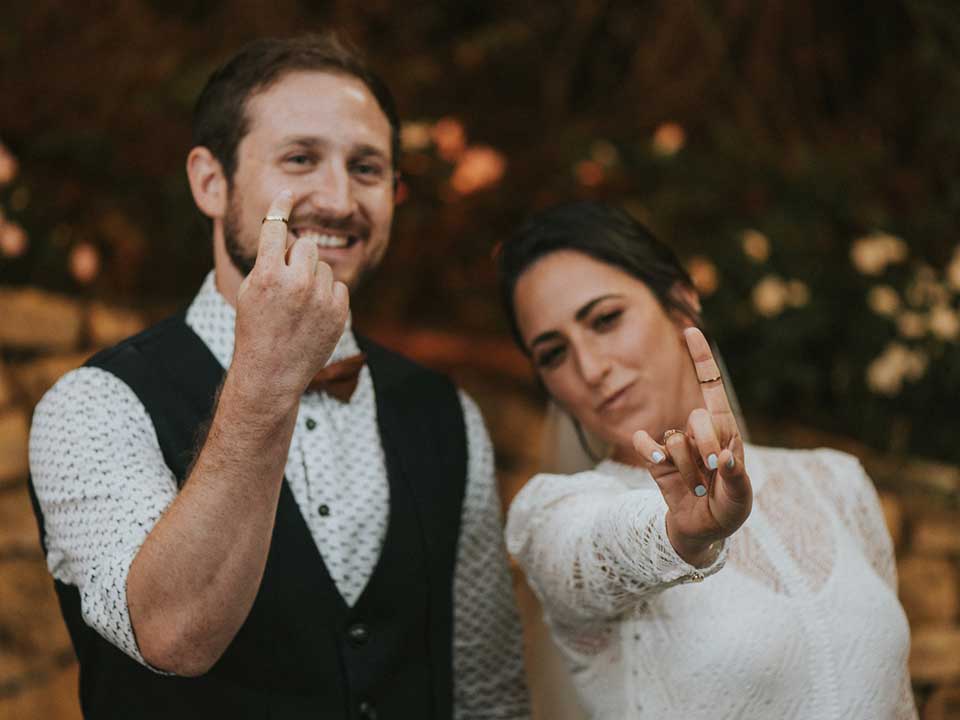Getting married soon? Mazal Tov!
Before you go to the Rabbinate and sign all sorts of forms because that’s what everyone else does, stop for a moment.
Marry responsibly, prevent the possibility of becoming an Agunah.
Let us tell you about the different options for a responsible marriage.
A prenuptial agreement is a key tool for preventing problems during divorce proceedings. Prenuptial agreements aim to prevent divorce refusals by enforcing financial sanctions.
The agreement is reciprocal and equal, and is based on a halachic mechanism that is supported by a wide range of Halachic authorities, and can be enforced in a family court.
Mention of the Agreement may be included in the Ketubah, for example, in the Ketubah formulated by Rabbi Yoel Bin-Nun.
* Couples who are already married may also sign the Agreement.
“Kiddushin on condition” is an option already mentioned in the Mishnah (Tractate Kiddushin III, B). This means that the validity of the marriage is conditional on the fulfilment of a certain condition set at the time of the chuppa. If the condition is not met – the marriage is void. Throughout the ages Halachik authorities have suggested using conditions to prevent problems over divorce issues.
The condition recommended by the “Mavoi Satum” organization allows you to protect yourselves from divorce refusal or from Aginut.
Interested in a Halachic wedding not through the rabbinate?
The Private Marriage Track of the “Mavoi Satum” organization allows you to hold a Halachically recognized religious marriage ceremony privately.
The ceremony is conducted according to Halacha, but also allows you to incorporate personal motifs. It is very important to sign an agreement for mutual respect and conditions in Kiddushin in this option as well.
Learn more about the options
Join the hundreds of couples leading the revolution for a Halachik marriage based on respect and equality.
Couples who get married responsibly recommend:
Shira and Elazar
When we finally decided to get married, we were bothered by some essential things. We recoiled from the rabbinate’s involvement in our ceremony and life. We also recoiled from the presence of a stranger in the moments of the ceremony where we sign the course of our lives. We wanted a personal, original and intimate ceremony.
On the other hand we knew it was important for our families that we get married in a Halachik Jewish ceremony.
A Halachik private marriage ceremony answered all of these wishes. We were especially pleased that my father (Shira, the bride) would marry us in a ceremony we designed ourselves, with what was important to us.
 Photography: Maya Amado
Photography: Maya AmadoSapir and Gilad
We chose a Halakhic wedding that is not through the rabbinate for a number of reasons. First of all – it was important for us to preserve the tradition but without losing the value of equality and mutual respect that is missing in the marriage process in the rabbinate and especially the chuppa ceremony. Second, we wanted to have a special connection with the rabbi, as a person we value and cherish as a man of values and not because of the title of “rabbi”. In the rabbinical institution we did not think we could find a rabbi who would devote time to study with us, get to know us personally and provide us with an in-depth Jewish experience. Finally, we wanted to emphasize that our wedding in 2018 is also a political act: it is possible without the Rabbinate Institution. It is not an integral component of a Jewish wedding in Israel. Only by disconnecting the institution from the Jewish circle of life can we bring the Israeli public back to Judaism.
 Photography: Erez Shaham
Photography: Erez ShahamNofar and Yossi
When we tried to think of the ceremony and celebration that best suited us, we wanted to take into account not only our desires and beliefs, but also to respect our parents and our families. We wanted to build our own rituals, yet have equality of expression. We wanted to express our relationship in our own way, but on the other hand we wanted our families to feel comfortable and respected. It was important to them that the ceremony be according to tradition, according to Halacha.
Thus we found the most suitable solution that reconciles with our desires and respects our family – a Jewish wedding which does not require registration with the rabbinate, which was very important to us. A ritual that preserves the symbols and customs according to Halacha but allows a lot of flexibility and especially a ritual that is egalitarian. We read words to our guests and to each other, we gave rings to each other, women also read the seven blessings and thus we honored key women in our lives. It turns out that all of these are allowed according to Halacha … We did not know that.
We as a couple were the center of the ceremony, we were very connected to what was going on and we felt that our family and friends around us, and those standing next to us under the chuppa were also very excited. To be honest, they were very proud that they were approached by friends and family after the ceremony who expressed great excitement at the great significance given to the marriage ceremony.
The signing of a prenuptial agreement and Aguna prevention agreement were also significant, another huge plus for us. We did not devote much thought to the issue because we are not thinking about separation, but we were happy to sign agreements that continue to exercise our belief in equality in relationships.
We have twin daughters today, and we are waiting for the moment we will sit together to watch the wedding ceremony, and they will see Dad and Mom together tell about the relationship and the future they are planning for them, This is the example of the relationship we want to build. Dad and Mom together, equal.
 Photography: Luz Danous
Photography: Luz DanousNoa and David
My partner and I chose to get married through the “Halachik private marriage” option. We chose this path because it was important to us that the marriage ceremony be according to Halacha and in the same breath we sought the equality and protection that is in Halacha but is not according to rabbinate.
In addition, it was also important for me to take part in the overall struggle with refusal to grant a divorce and Agunot and to be one of the voices that are creating a new reality.
 Photography: Mruwka Photographers
Photography: Mruwka PhotographersNeta and Assaf
We chose to get married in a Halachik Jewish wedding, in front of witnesses, family and friends – this is our tradition and it was important for us to follow it properly.
We also chose not to marry through the Chief Rabbinate. Marriage is a public status, and what is done in public testifies to our values and the norms we are willing to accept. The narrow way that the rabbinate dictates, its preoccupation with who is Jewish enough, and their treatment of women in general – do not fit our values.
Mavoi Satum helped us in the preparation process, and allowed us to have a wedding that fit both our tradition and our values.
 Meitav and Kerem
Meitav and KeremMeitav and Kerem
Kerem and I got married almost 4 years ago. It was important for us to incorporate in the traditional ceremony the values that are essential to us. We studied the subject and chose to invite couples to recite the seven blessings, the man recited the blessing and the woman recited appropriate verses. We said to each other “Be my woman” and “Be my man” instead of the one-sided wording “Harey AT Mekudeshet Li”. We made the blessing of SheHechiyanu together and wrapped ourselves in the tallit I gave to Kerem . We also entered the chuppa together as a sign of the reciprocity of the chuppa and marriage. The ketubah was signed under the chuppa and so I represented myself, and at the same time we also mentioned the conditional signing of Kiddushin and the prenup which are the halakhic tools that allow minimizing the problem of Agunot and refusal to grant a divorce. Neither Kerem nor I think we will need these tools in practice but it is important for us to raise awareness of these possibilities in the hope that they will become a prevalent norm and protect those who will need them.
 Maayan and Nathanel
Maayan and NathanelMaayan and Nathanel
I come from a religious home, and alongside my love for religion, prayer and Torah study I have a strong feminist consciousness that often challenges my Halakhic conception.
When my partner and I got engaged, I knew that in light of these tensions, I would prefer to build the chuppa ceremony as a ritual I followed according to my worldview, rather than the view of the rabbinical establishment.
I did not want to align myself with the establishment, which in my eyes fills its role sinfully, by being unnecessarily strict in many cases and thus distancing people from religion instead of bringing them closer. This is reflected in many areas such as kosher certification for restaurants, clarification of Jewish status, conversion of people from the USSR and the rabbinate’s attitude toward the Ethiopian community in the country.
Also, when we decided to get married Halakhically, I knew I was putting myself in a situation where the relationship between a man and a woman was not equal. Therefore, in order to avoid as much as possible Halakhic situations of refusal to grant a divorce and Aguna status resulting from the inequality of halakhic marriage, we turned to Mavoi Satum. We have greatly benefited from the organization, and have received professional and attentive guidance throughout the process, for which we are sincerely grateful.
If you are planning a wedding – know that you have options!
 Photography: איציק מילר
Photography: איציק מילרEyal and Ilana
We are a secular couple, in Chapter Two of Relationships and Family.
At one point we decided we wanted to get married, despite quite a few raised eyebrows around (they did not understand why we needed this again).
My partner opposed the Chief Rabbinate’s involvement in the process, due to a combination of ideological gaps and jarring encounters with the rabbinate in the past. I am secular (agnostic, not an atheist) though, but I have a warm place in my heart for religion due to a close connection with my grandfather who was religious. From an emotional point of view, I am less attached to the postmodern alternatives of the institution of marriage even though they are not inappropriate in my eyes. For me there is added value to a wedding insofar as it reflects its original content, i.e. the religious content. The legal situation in the country, according to which a Jewish marriage not by the rabbinate is prohibited by law has led us to Mavoi Satum- a dead end (literally). More than that, the understanding that we can accept recognition of marriage religiously and legally without the mediation of the rabbinate, only if the wedding takes place outside the borders of the Jewish state is absurd. That is why for us Mavoi Satum was precisely the solution. Along the way, we were exposed to other important issues such as conditional Kiddushin and gave expression to them in the process, in addition to the financial agreement we made at the beginning of our common journey.
So we were religiously married by an Orthodox rabbi at a private wedding. The guidance of Mavoi Satum was sensitive and generous. After about a year, we ‘were forced’ to enjoy an entire weekend in Cyprus, so that we could also receive official state recognition of our marriage, and today we are Jewish and Israeli married, without going through the rabbinate. If it were not possible to marry in a Halachik private marriage, we probably would not be married in the Jewish sense. By the way, we already have a child …
 Dror and Adi
Dror and AdiDror and Adi
As with all aspects of our relationship, we were looking for the right way to give expression to the beliefs and values that are important to us as a couple, and important to each of us individually.
Bearing in mind that women’s rights are not at the forefront of the rabbinate’s eyes, and that the State of Israel restricts the Jewish wedding to the walls of the rabbinate only, we understood that this is not the way we were seeking.
At the same time, it was important for us to undergo a Halakhic Jewish marriage, as our parents and grandparents got married before us, as Jews around the world marry every day.
Through “Mavoi Satum” we received an answer to all the things that were important to us, with guidance to the halakhic considerations and legal meanings. We were fortunate to experience a ceremony that was meaningful and right for us.
 Photography: flea studios
Photography: flea studiosAdi and Amnon
My spouse is secular, from a secular home and I am a religious from a religious home. It was important for us to get married in a way that would respect both of our family’s traditions. It was important for both of us that we reach the egalitarian level that the law allows, without restrictions that have a political or religious-power background. Beyond that, we do not feel that we align religiously with those who are appointed to the rabbinical institution, and on the contrary – we feel aversion to it. We were looking for a system that could support us in a Halakhic wedding outside the rabbinate, and we found what we desired 🙂









